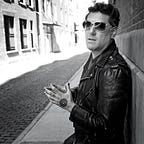Is the Occult Evil?
Or, at least, not very nice?
When I tell people that I’m a historian of the occult — and that I’m personally a seeker into occult and esoteric questions — I receive strange looks. “I think of the occult as evil,” a home contractor, eyeing my bookshelf, once told me. In one of my favorite New Age shops in Salem, Massachusetts, I once overheard a mom dissuading her daughter from buying a pentagram necklace on account of it being “evil.”
Is that a fair attitude? The famed British occultist Aleister Crowley (1875–1947) freely called himself the “Great Beast.” (Try explaining that to a jaundice-eyed cable television producer.) In the occult flowering of the late 1960s, organizations such as Anton LaVey’s Church of Satan and the ardently unclassifiable Process Church flourished. Ouija boards were said to channel demons, and Time infamously asked, “Is God Dead?” (A cover that produced a memorable moment from Roman Polanski’s horror classic Rosemary’s Baby — itself adjunctly timed to the murderous apocalysm of Charles Manson.) One of the most popular expository books of the era, to which I’ve written a new introduction, was historian Richard Cavendish’s broodingly titled The Black Arts.
